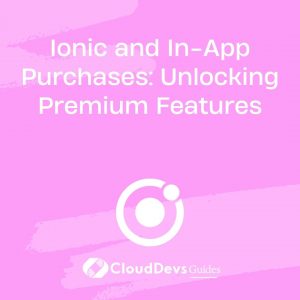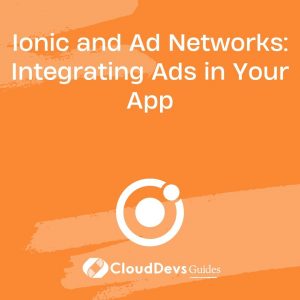Courses and Certifications to Master Ionic in 2023
Ionic has established itself as a prominent framework suitable for various applications, and it has garnered widespread adoption across businesses of all scales. Ionic empowers developers to create robust applications efficiently, and there is a growing demand for Ionic developers.
Table of Contents
If you are enthusiastic about improving your Ionic programming skills or embarking on a career in Ionic development, exploring certification programs or enrolling in pertinent courses can offer significant benefits. In this article, we will delve into some of the leading Ionic certification choices and courses that are accessible in 2023.
1. Ionic React: Cross-Platform Mobile Development with Ionic by Udemy
The Ionic React: Cross-Platform Mobile Development with Ionic course by Udemy is designed to help you create mobile web and native Android/iOS apps from a single codebase with React, Ionic Framework, Capacitor, and Firebase. Taught by Mirko Nasato, this course covers everything from beginner to advanced topics and is highly rated by students.
The course has 12 sections adding up to 107 individual lectures.
The course modules are;
- Introduction: This section is a basic introduction to what Ionic is, and what are the required tools.
- From React to Ionic: In this section, you will learn about making a Hello World, adding ionic to react project, toast message, Ionicons, full-page8 ionic apps, and source code.
- Developing a Complete Single-Screen App: In this module, you will learn about building a Biorhythm calculator, source code, input fields, filed labels, data fields, target date, card component, day.js, unit test, and production build and deployment.
- Building Android and iOS Apps with Capacitor: In this section, you will learn about capacitor installation, android studio installation, android versions, android emulator, Android build and Run, Physical Android Devices, Live Reload on Android, Chrome Remote Debugging, etc.
- Using the Ionic CLI to create new projects: This section has seven lectures adding up to 43 minutes, and it teaches about Ionic / Capacitor versions, Ionic CLI Installation and usage, generated code tweaks, Livereload with capacitor, etc.
- Page Navigation and Routing: In this module, you will learn about React Router, IonReactRourwe, IonTabs, IonList, Route Params, Back Buttoms, Login Flow, etc.
- Authentication and Firebase: In this section, you will learn about Firebase SDK Version, creating a Firebase project, enabling authentication and user sign-in, login form, handling login errors, firebase AuthState Observer, logout functionality, registering new users, etc.
- Storing Data with Cloud Firestore: In this section, you will learn about creating a database, cloud Firestore data model, fetching a firestorm collection, fetching a firestorm document, entry interface, query order, limit, etc.
- Storing Image Files with Cloud Storage: In this topic, you will learn about enabling cloud storage, allowing users to select a picture, hiding the file input file, uploading files to cloud storage, and displaying images from cloud storage.
- Using Native Camera API: In this topic, you will learn about testing the app on Android, using Camera API, camera options and errors, enabling different features by platform, and upgrading to Firebase v9.
- Publishing to the App Store: This section covers six lectures, and it teaches about preparing for an Android release, building a Signed APK, building an Android app bundle, publishing to Google Play, etc.
- Conclusion: This is the final module, and it basically is a short video congratulating you for finishing the course successfully.
By the end of this course, you will receive a certificate of completion.
2. Ionic 7+ and NodeJS to Pro-Build Food Delivery App by Udemy
The Ionic 7+ & NodeJS: Beginner to Pro-Build Food Delivery App course by Udemy is designed to help you build a food delivery app and many more with Ionic 7+ Angular, Capacitor 5 & Nodejs (Typescript) as Backend with MongoDB. This course is taught by Nikhil Agarwal, this course covers everything from beginner to advanced topics and is highly rated by students.
This course covers 36 sections, each adding up to 81 hours of course content.
The course modules are;
- Introduction to the Ionic Framework: Gain insights into Ionic’s core concepts and its role in modern app development.
- Setting up the environment: Learn the step-by-step process to configure your development environment for Ionic projects.
- Building native apps with Capacitor: Explore how to leverage Capacitor to create cross-platform native applications seamlessly.
- Ionic basics: In this topic, you will In this section, you will dive into the fundamental elements and principles that underpin the Ionic framework.
- Working with HTTP requests: Here, in this topic, you will learn to handle HTTP requests and integrate data into your Ionic apps.
- Debugging Ionic apps: In this topic, you will discover effective debugging techniques to troubleshoot and refine your Ionic applications.
- Styling and theming Ionic apps: Craft visually appealing and customized designs for your Ionic app interfaces.
- Using some native device features: In this section, you will explore the integration of native device functionalities within your Ionic apps.
- Ionic components: In this module, you are acquainted with a variety of UI components offered by Ionic for streamlined app development.
- Integrating PWA Elements: In this topic, you will learn how to seamlessly integrate Progressive Web App elements into your Ionic projects.
- Inline components: In this section, you will explore the creation and implementation of inline components for enhancing app functionality.
- Getting Started with Food Delivery Apps: This section helps you begin your journey into developing feature-rich food delivery applications using Ionic.
- State Management: In this topic, you will learn the techniques of efficiently managing application state within your Ionic projects.
All 36-course modules are not listed above, however, this course aims to teach you about building a food delivery app like Uber-Eats, using Redis for Blacklisting RefreshTokens, and also learn about integrating payment Gateways such as STRIPE and Razorpay.
3. Angular, Ionic & Node: Build A Real Web & Mobile Chat App by Udemy
Angular, Ionic & Node: Build A Real Web & Mobile Chat App is a course offered by Udemy and it teaches you how to connect your Angular and Ionic frontend to a Node.js and MongoDB backend by building a real web and mobile chat app. You will learn to build real Angular and Ionic apps with Node.js backend, understand RESTful API design, use JWT for authentication, and much more. The course has a rating of 4.6 out of 5 and is suitable for all levels.
The course modules are;
- Introduction: Get an overview of the course objectives and the fundamentals of Ionic development, setting the stage for your learning journey.
- From React to Ionic: Transition smoothly from React to Ionic as we explore the key differences and commonalities between these two powerful frameworks.
- Developing a Complete Single-Screen App: In this section, you will dive into hands-on development by creating a fully functional single-screen app from scratch, mastering essential Ionic components along the way.
- Building Android and iOS Apps with Capacitors: In this section, you will learn how to leverage Capacitor to transform your single-screen app into cross-platform Android and iOS applications, ensuring wide accessibility.
- Using the Ionic CLI to Create New Projects: In this topic, you will explore the power of the Ionic Command Line Interface (CLI) for efficient project creation and management, streamlining your development workflow.
- Tools Installation: Get your development environment ready with the necessary tools and dependencies, ensuring a hassle-free development experience.
- Creating Angular Project: Understand the integration of Angular with Ionic, and create an Angular project that seamlessly integrates with your Ionic app.
- Authentication Components: In this section, you will dive into the world of user authentication by building robust authentication components that enhance the security of your app.
- Login and Sign-Up Authentication: In this section, you will explore the critical aspects of user security as you implement user login and sign-up functionalities within your Ionic app.
- Posts Section: Create a dynamic posts section where users can share and interact with content, gaining practical experience in handling data and user-generated content.
- Users Section: Develop a dedicated user profile section, enabling users to manage their profiles, settings, and interactions within your app.
- Private Chat Section: Implement real-time private chat functionality, utilizing Ionic’s capabilities to enable secure, one-on-one communication between users.
This course will equip you with the skills needed to develop feature-rich Ionic applications, from the basics of setup and single-screen apps to advanced topics like authentication, user profiles, and real-time communication.
4. Learn Ionic 3 From Scratch by Udemy
Learn Ionic 3 From Scratch is a course offered by Udemy. This course teaches you how to create cross-platform mobile applications with Ionic 3, Angular 4, TypeScript, and Firebase. You will learn to create a mobile application that interfaces with the GitHub API, create a real-time chat application with Ionic 3 and Firebase, and create an application prototype with Adobe Experience Design. The course has a total duration of 10 hours and 2 minutes and is suitable for all levels.
- Introduction: You will gain an understanding of the Ionic framework, its features, and its significance in modern app development.
- Angular 4 Primer: You will learn the essentials of Angular 4, the underlying framework for Ionic development, including components, templates, and data binding.
- Ionic 3 CLI: This section teaches you about the Ionic Command Line Interface (CLI) and explores its capabilities for creating, building, and managing Ionic projects.
- Getting Started with Ionic 3: You will get hands-on experience by creating your first Ionic 3 application, covering project structure and basic setup.
- Project: Greeting Application: You will learn to apply your knowledge to build a simple greeting application, practicing Ionic components and navigation.
- NEW: BMI Calculator: This section helps to explore a new project, creating a Body Mass Index (BMI) calculator, while reinforcing your understanding of Ionic concepts.
- Navigation: In this section, you will learn advanced navigation techniques to create seamless user experiences within your Ionic applications.
- Theming: You will learn to customize the look and feel of your Ionic apps by delving into theming and styling options.
- New: Bitcoin Price Tracker: In this topic, you will learn to build a real-time Bitcoin price tracking app, incorporating data fetching and display functionalities.
- Project: Flashlight Application: You will learn to develop a flashlight application, utilizing device features through Ionic Native plugins.
- Project: GitHub Profile Searcher: You will create an app that allows users to search and view GitHub profiles, reinforcing your skills in API integration.
- Project 2: Shopping List – Ionic and Firebase CRUD: This topic teaches you to build a shopping list app with Ionic and Firebase, focusing on creating, reading, updating, and deleting (CRUD) operations.
- UX Driven Design: Designing the ‘Beep’ Application: You will learn user experience (UX) design principles while designing the ‘Beep’ chat application for Ionic 3.
- Work in Progress: Beep: In this module, you will begin the development of a chat application with Ionic 3 and Firebase, putting your design and development skills to the test.
- Ionic 3 Components: In this topic, you will explore a wide range of Ionic components to enhance the functionality and aesthetics of your apps.
- Ionic Native Plugins: In this section, you are given expertise in using Ionic Native plugins to access native device features and APIs.
- Miscellaneous: This is the final module and it cover various additional topics and advanced techniques to expand your Ionic development toolkit.
This comprehensive course provides a structured path to becoming proficient in Ionic 3 development, equipping you with the skills to create versatile and feature-rich mobile applications.
Here is a comparison table of the Ionic courses mentioned above.
| Course/ program | Cost | Level | Duration | Study mode |
|---|---|---|---|---|
| Ionic React: Cross-Platform Mobile Development With Ionic | $74.99 | Intermediate | 9.5 hours | Online |
| Ionic 7+ and NodeJS: Beginner to Pro-Build Food Delivery App | $74.99 | Beginner / Intermediate / Advanced | 81.5 hours | Online |
| Angular, Ionic and Node: Build a Real Web and Mobile Chat App | $74.99 | Intermediate / Advanced | 37 hours | Online |
| Learn Ionic 3 From Scratch | $19.99 | Beginner | 12 hours | Online |
The table above highlights the disparities among Ionic courses in terms of duration, costs, and skill prerequisites. it is evident that some courses come with a price tag, while others are freely available, catering to individuals with varying levels of proficiency. When selecting an Ionic course, it is essential to consider your skill level, budget constraints, and career objectives. This approach will enable you to identify the most suitable Ionic course for your needs.
Conclusion
In conclusion, enrolling in an Ionic course in 2023 presents an excellent opportunity to advance your career prospects. By acquiring the right training, you can enhance your skills as an Ionic developer and participate in exciting projects. Whether you are a novice or a seasoned programmer, there are numerous courses and certification programs available to help you elevate your Ionic development skills.
Table of Contents







